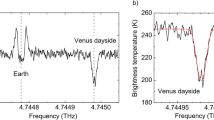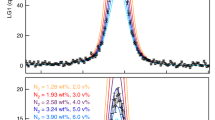Abstract
THE satellite 1967–118A, WRESAT, was launched from Woomera, Australia, at 0435 h on November 29, 1967, into a nearly polar orbit. Included among the experiments were two sets of ion chambers sensitive to the vacuum ultraviolet. They were designed to determine the density of molecular oxygen in the mesosphere and lower thermosphere by measuring the absorption of solar radiation by the atmosphere as the vehicle went through satellite sunrise and sunset.
This is a preview of subscription content, access via your institution
Access options
Subscribe to this journal
Receive 51 print issues and online access
$199.00 per year
only $3.90 per issue
Buy this article
- Purchase on Springer Link
- Instant access to full article PDF
Prices may be subject to local taxes which are calculated during checkout
Similar content being viewed by others
References
Watanabe, K., Adv. Geophys., 5, 157 (1968).
Ogawa, M., J. Geophys. Res., 73, 6759 (1968).
US Standard Atmosphere Suppl., 36 (1966).
Stewart, K. H., and Wildman, P. J. L., Nature, 219, 714 (1968).
Author information
Authors and Affiliations
Rights and permissions
About this article
Cite this article
LOCKEY, G., HORTON, B. & ROFE, B. Satellite Measurement of Upper Atmospheric Molecular Oxygen Densities. Nature 223, 387–388 (1969). https://doi.org/10.1038/223387a0
Received:
Issue Date:
DOI: https://doi.org/10.1038/223387a0
Comments
By submitting a comment you agree to abide by our Terms and Community Guidelines. If you find something abusive or that does not comply with our terms or guidelines please flag it as inappropriate.



